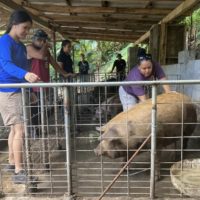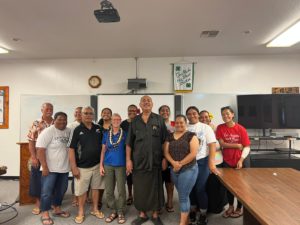
The American Samoa Community College (ASCC) – Agriculture, Community and Natural Resources (ACNR) Division has completed its second Swine Artificial Insemination (AI) Project for local pig breeders.
The three-month long project familiarized pig farmers with Artificial Insemination as a scientific method to alleviate inbreeding and enhance sow fertility, genetics, and production.
“Healthy, fast-growing, and highly productive swine characteristics are the goal of every producer,” said Agriculture Extension Agent, June Talamoni. “However, there is a decline in these characteristics within our local production due to continued inbreeding.”
To address the inbreeding issue, ACNR implemented an artificial insemination Program with the guidance of visiting authority Dr. Halina Zaleski, an Extension Swine Specialist from Canada.
For crossbreeding, Dr. Zaleski brought new boar semen from three different pig breeds: the Landrace, Yorkshire, and Duroc. The Landrace and Yorkshire breeds are known for their maternal traits, which in breeding can improve the genetics of female pigs. The Duroc breed is known for its terminal traits, which can likewise improve the genetics of male pigs.
Dr. Zaleski and a team consisting of ACNR staff and ASCC students visited farms to educate farmers about artificial insemination, and inseminating sows ready to reproduce.
27 sows were successfully inseminated from 15 different farms. The offspring from these sows will be weaned and selected for breeding animal replacements.
The success of the project will depend on farmers utilizing the offspring of the inseminated sows for further breeding, as well as selling them to other farmers to help improve their own swine production.



